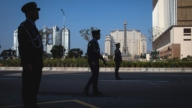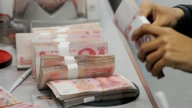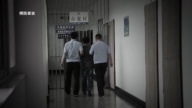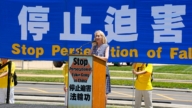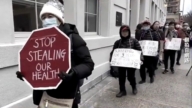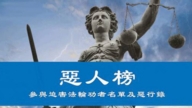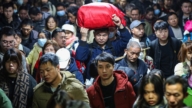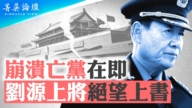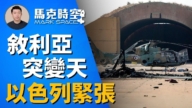【新唐人2011年9月3日讯】最近中共少将金一南在讲座中,列举多起党政军高官向海外出卖情报的间谍案,视频流传到网上,引发国际媒体关注。中共喉舌媒体《环球时报》随后发表评论,声称这些案件不是秘密,试图为泄漏机密灭火。有评论指出,中共高官成为外国间谍,说明共产党覆没在即,官员各自逃生。
金一南提到的间谍案中,包括前中国驻韩国大使李滨被韩国收买、中国核工业集团总经理康日新向外国出卖中国核材料情报,以及全国社保基金理事会办公厅主任佟达宁,向台湾泄露中共国务院和中央文件等案。
金一南透露,这些人犯的是向海外出卖情报的间谍罪,但是中共对外宣称是经济腐败罪。
而《环球时报》评论员的文章说,金一南的讲课并没有泄密,他所举的案例不是国家机密,只不过以前没有被媒体公开报导过,或者报导的口径不太一样而已。
但是BBC评论指出,即使《环球时报》试图扑火,但中共当局一贯视之为应该高度保密的中共党内间谍案件,被泄露到网上,一定使当局既难堪又恼怒。
浙江专栏作家陈树庆指出,中共把自己做的丑事作为国家秘密,才会遮遮掩掩。
陈树庆:“他有任何丑闻、坏事情都喜欢内部处理。更何况他本身这些案子处理当中,也有很多不公正、不公平的地方。有些事情出于争权夺利,或者政治迫害的原因,小事扩大化。那有些事情也有大事化小,为了防范中共露出更大的弊端、更大的丑闻。他这里没有什么司法公正。”
金一南在录影中反问:“看看全世界,有哪一个国家的大使会成为别国的间谍?只有我们国家。”
他分析说,“几十年的经济改革后,我们见证了意识形态强度的缺乏,以及精神水坝的溃堤,导致了近期连续的叛变事件。”
不过,中国民主党创建人之一,湖北异议人士秦永敏认为,中共高官成为外国间谍层出不穷,原因是:共产党人心离散,大厦将倾。
秦永敏:“他清楚的表明这个船要沉了。一些老鼠就开始匆匆的下船。在这种情况下,他们很多人都慌不择路,只要有机可乘。我想这些人大部分不是因为有什么政治需要,而是多半都是为了个人目地,为个人留下一些后路。”
金一南谈间谍案视频上网后,海外媒体广泛报导,包括英国金融时报、CNN、纽约时报、美国广播公司、卫报、美国之音、BBC、悉尼晨锋报、联合早报和中央社等。
英国《金融时报》评论说,执政的中国共产党将许多有关的军事战略、外交政策和政治体制的细节,当作国家机密对待。然而随着互联网的兴起、中国国内公众的辩论日益活跃,“内部”和“外部”之间的界线,正变得越来越模糊,像金一南这样的军校教员也常常发表爆炸性言论。
《环球时报》文章谴责把金一南的视频放上网路的行为,声称这是对信息处理不负责任的倾向。《金融时报》引述北京大学国际关系学院教授朱峰的话说,“这反映出在当前全球化的时代,中国必须加强国家安全体系。”
不过BBC报导认为,金一南事件和近来中国微博网站的“辟谣公告”等,都会加速当局对互联网尤其是微博采取更强的控制力度,避免出现类似的让公众太过知情的情况。
新唐人记者秦雪、周天采访报导。
Chinese Spy Video Draws World Attention
Recently, in a lecture the Chinese Communist Party’s (CCP)
Major-General Jin Yinan cited many spy cases, in which
CCP high-ranking military officials sold intelligence overseas.
After being put online, this video has drawn international
media attention.
CCP’s mouthpiece media, Global Times later claimed that
the cases mentioned in the video are not secrets,
trying to downplay the significance of this video.
Some commented that Chinese officials as foreign spies,
indicating that the CCP’s going to collapse soon,
and the officials are all trying to escape.
Jin Yinan mentioned several spy cases in the video.
Former Chinese ambassador to South Korea, Li Bin,
was won over by South Korea.
China Nuclear Industry Corporation’s general manager
Kang Rixin sold nuclear intelligence to foreign countries.
National Council for Social Security Fund director
Tong Daning gave CCP State Council documents to Taiwan.
Jin Yinan said that these people’s crime is espionage.
but the CCP’s announced it to be corruption.
Global Times published an article saying that
Jin Yinan’s lecture did not reveal any secrets.
The cases he cited were not state secrets.
They just have not been reported by the media previously.
BBC commented that even that Global Times tried to
downplay the incident, the Chinese authorities must be
embarrassed and infuriated, as these espionage cases
were always regarded as highly confidential,
and now they can be seen online.
Zhejiang-based columnist Chen Shuqing said that
the CCP treats all its own scandals as state secrets,
so it would try to cover them up.
Chen Shuqing: “(The CCP) likes to deal with all scandals
and negative things internally.
Not to mention the unjust and unfair things it does
in handling of these cases.
The CCP can exaggerate and trivialize things at will,
in order to persecute people or to prevent the exposure of
its shortcomings and scandals. There is no justice there."
Jin Yinan asked in the video:
“In the entire world, which country’s ambassadors would
become spies for other countries? Only our country."
His analyzed, “After decades of economic reform,
we have witnessed the lack of ideological strength
and the collapse of people’s spirit,
leading to the recent continuous defections.
Co-founder of China Democracy Party and Hubei-based
dissident Qin Yongmin believes that
the reason that an endless stream of CCP officials become
foreign spies is: the CCP is utterly isolated and collapsing.
Qin Yongmin: “This indicates clearly that the ship (CCP)
is about to sink, and the mice began to rush to disembark.
Many of the CCP officials are rushing to find a way out.
I don’t think most of them have any political needs.
They just want to leave a way out for themselves.”
Jin Yinan’s spy case video has been widely reported by
world media, including Financial Times, CNN, ABC, BBC,
The New York Times, The Guardian, the Voice of America,
Sydney Morning Herald, Singapore’s Lianhe Zaobao
and Taiwan’s Central News Agency, etc.
Financial Times commented that the ruling CCP treats many
details of its military strategies, foreign policies and its
political system, as state secrets.
However, with the rise of the Internet, the public debate in
China has become increasingly active.
The boundaries between “domestic” and “international” are
becoming increasingly blurred.
A military instructor like Jin Yinan
can even have frequent explosive comments.
Global Times condemned the practice of putting Jin’s video
online, calling this irresponsible.
Financial Times quoted Professor Zhu Feng of the Institute
of International Relations at Peking University, as saying,
“This reflects that in the current era of globalization,
China must strengthen the national security system."
However, BBC’s report said that the recent events would
accelerate the authorities’ control of the Internet,
especially microblogs, to limit information to the public.
NTD reporters Qin Xue and Zhou Tian





